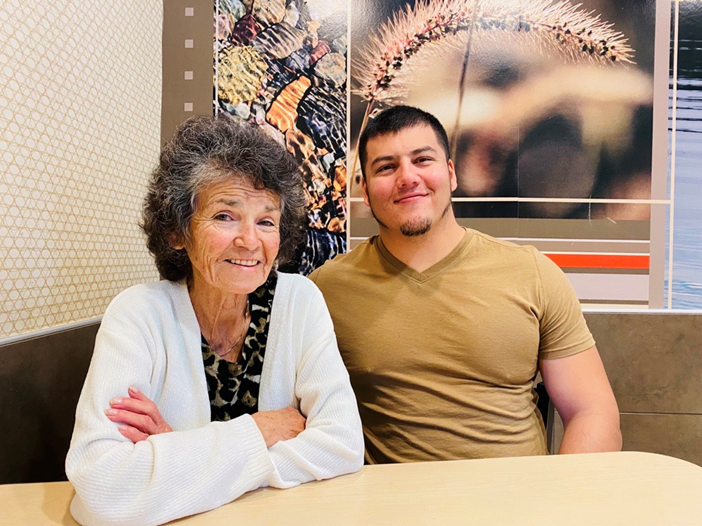The Nuclear Waste Management Organization (NWMO) is implementing a long-term, multi-generational national infrastructure project that benefits from the guidance and knowledge of the Council of Knowledge Holders, an independent advisory body. Elder Dorothy Parenteau is a bright light whose guidance has helped shape the NWMO’s work to date, and she’s passing her wisdom and traditional teachings on to the next generation, like Youth member Jeremiah George who will continue this work.
The Council of Knowledge Holders inspires new outlooks and shares perspectives, and helps to inspire the NWMO to be open to learning from spirit and ceremony as they explore their journey in Reconciliation.
“By doing Reconciliation work in this way it creates space for reflection, compassion and love, which is not typically encouraged within corporate culture but is so important if the NWMO wants to get Reconciliation work right,” said Elder Dorothy.
Elder Dorothy has been on The Council since 2016. She follows the traditional teachings of the Anishinaabe Nation and is a member of the Waabigonniiw Saaga’iganiiw Anishinaabeg (also known as Wabigoon Lake Ojibway Nation). She is a member of the Bear Clan and is known by her spirit name “Standing in Line with the Thunderbirds”. The kinship clan system in Anishnaabe teachings has been used for centuries to identify Indigenous peoples’ roles within their community. The clans, based mainly on animals, were instrumental in traditional occupations, intertribal relations, and marriages.
She worked for the Ministry of Natural Resources for 26 years and she taps into that experience to provide strategic advice to the NWMO.
“I find the NWMO very respectful to First Nations and Métis peoples. As we sit in circle, we learn from each other and respect all perspectives within our circle. I am also very proud of the youth and the important role they bring into the circle,” said Elder Dorothy Parenteau
Youth members on the Council offer valuable input as future leaders. The NWMO is honoured to learn from Indigenous Knowledge Keepers and works to interweave traditional knowledge into all aspects of its work. This includes applying this knowledge to field work such as performing ceremony before borehole drilling activities took place in the South Bruce site.
For Jeremiah, joining The Council came after observing the NWMO’s work in engaging with the community in his own region. He was also excited about the opportunity to learn firsthand from so many Elders.
“Elder Dorothy is very traditional in how she approaches dealing with her family, people, work, and nature in general. It means a lot to me to be able to observe her and absorb her approach. It's a very practical outlook on spirituality,” said Jeremiah. “She makes me feel like I can do anything and it's important to make others feel the same way.”
Jeremiah is on a learning journey of his Anishinaabe teachings and is known by his spirit name “Blue Thunderbird.” Born in Dryden, Ontario and raised in Winnipeg, he is a new Youth Council member who brings his teachings, career experience in project management and a fresh perspective. He also feels so honoured to be able to learn from Elders and other members of the Council from his home community of Wabigoon Lake Ojibway Nation.
“Elder Dorothy has taught me to always be respectful, supportive, honest and forthcoming with anybody I deal with. The spirits of our family members are always watching us, and we must do everything we can to honour them,” said Jeremiah.
Indigenous Knowledge is often passed on through oral teaching, and Elder Dorothy feels it is her duty to pass on the teachings and knowledge with the younger generation to ensure they understand their inherent responsibilities as caretakers of Mother Earth. She feels this is critical in making sure these learnings are kept alive from one generation to the next and encouraging both the NWMO and youth like Jeremiah to take this responsibility of protecting people and the environment to heart for generations to come.
“Remember that we need Mother Earth for survival, but she doesn’t need us, so the next generation has a role to protect her for the gifts she provides,” said Elder Dorothy.

